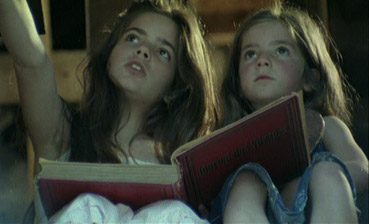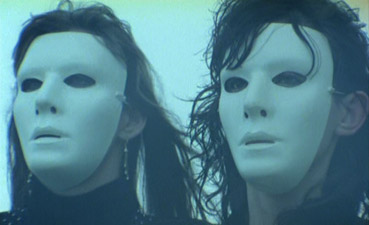|
If
you don't know the work of French director Jean Rollin then
one thing's for sure – you're not a vampire movie fan, or
at least not a hardcore one. Rollin began making films in
1958, but ten years later created what is credited as the
first French vampire film Le Viol du vampire
(aka Queen of the Vampires, aka The
Rape of the Vampire), and despite the film's initially
shaky reception, Rollin has never looked back. At a time
when Hammer's once-popular output was fading, Rollin was
creating stylish and poetic fantasy films that were as influenced
by expressionism and the avant garde as they were by classic
Hollywood horrors. Rollin's vampire films in particular
embraced the genre's underlying eroticism, and although he
worked cheap and fast, his evocative use of locations and
music, the poetry of his stories and characters, and his
sometimes dream-like imagery put his best films in a class
that most higher budgeted mainstream productions could only
dream of entering.
Allegedly
a semi-improvised experiment in which footage spontaneously
shot by Rollin and his two actresses on a trip to New York
was expanded on and given structure on their return to France,
Lost in New York enigmatically blurs the
distinctions between reality, memory, dreams, imagination
and the supernatural. An old woman, Michèle, recalls
a childhood encounter with Marie, a young girl she finds
crying in a presbytery garden because she has no-one to
play with. She is holding a statue of a figure she believes
is the Moon Goddess and invites Michèle to go on
a journey with them, one that involves a picture book
that allows its young readers to dream – or perhaps to be
physically transported in time and space – to a beach populated
by masked spirits, to early womanhood, and to another continent.
In New York the two girls, now older, find themselves lost
and separated, but drawn to find each other in a place very
different to the one they have just left.

Alternately
literate, playful and suggestive, Lost in New York is in some ways one of Rollin's most personal films, uniting
elements and imagery from his earlier work and his own fascination
with cinema, evident in the influence of the past films
of his countrymen and the picture-book trip through favourite
movies and characters that the two young girls might allow
themselves to become. Intriguingly, the sometimes landmark
view of New York remains an outsider's one, a cinematically
familiar location that here feels as alien to us as it is to
Marie and Michèle. We are tourists here, lost in
a city where the two girls can be within yards of each other
and yet fail to connect, where roses are handed to each
by the same passer-by, where an attempted mugging can result
in death, and where vampires feed on willing victims after
nightfall, only to perish with the rising sun. "Fantasies
die at dawn," the stony male voice-over reminds us,
having already suggested that at least part of what we are
watching is a shared dream. A typically atmospheric music
score, here by Philippe d'Aram, contributes to the film's
sense of reality dislocation.
As
the two girls are reunited as old women, they reminisce
once more and it is left for the audience to find their
own reading of exactly what has occurred, and far be it
from me to impose my own version on first-timers. Lost
in New York has the structure of a poem and is
as deliberately open to interpretation and meaning. It's
an indication of Rollin's assurance that even at its most
disorientating, the content never feels random or superfluous,
and gels into a gently beguiling whole.
A
non-anamorphic 1.66:1 transfer from a print that's busy
with dust, the odd scratch and the occasional blip of frame
damage. This is at its worst near what are likely the reel
changes, but things do improve between the troughs. Contrast
and detail are not bad, although shadow detail is weak and
the always evident film grain most prominent in the darker
scenes. The press notes claim it has been remastered from
the original negative, but I just can't see it. The film
was made for TV, hence the rather crude looking video-added
credits.

The
Dolby 2.0 mono soundtrack is functional rather than sparkling,
but has no obvious problems. For a Dolby 2.0 track, it's
surprisingly loud.
The
optional English subtitles are clear, but a little on the
small side – I had no problem with them and they could even
be said to be less intrusive than larger subs, but if you
have a sight impairment this could be an issue.
Redemption
has included two valuable and very welcome extras here
in the shape of two of Jean Rollin's early short films.
Les
Amours Jaunes (1958) (10:09)
Made in 1958, this was Rollin's first film, shot at weekends
with friends on equipment borrowed from his daytime job
at a newsreel company. With a soundtrack comprised of the
poem of the same title by Tristan Corbiere from which the
film takes its inspiration, and the visuals a blend of near-narrative
live action and Fabien Loris drawings, it has the air of
a detailed and self-confident cinematic sketchbook, energetic
and rich with ideas but not quite fully formed. Its inclusion
is of particular interest here due to the similarity of
some elements to those in Lost in New York,
including the use of voice-over and illustrations, and Rollin's
favourite Dieppe beach location. The print is a little ragged,
as you would expect of a short film of this vintage, and
includes the occasional bit of picture judder and soundtrack
fluff. Surprisingly, considering the letterboxed main feature,
it's anamorphically enhanced.
Les Pays lion (15:41)
A man lost in a maze of broken down buildings and back streets
rejoins his female companion, and the two begin a search
for the route to the city centre. Neither can remember how
they got there or much about their lives before their recent
meeting, and they have no clear indication of their location.
When they do encounter other people, their requests for help
are met with bemusement in a language they do not understand.
At one point the man finds a building he recognises, but
the friend who lives within appears too busy to help them
and, after remarking on the man's improved language skills,
hurriedly departs. Rollin's
rarely seen fifth film is a confident and unsettling work
with Kafkaesque overtones, its sense of individuals in confused
isolation a theme the director was to revisit in his features.
Once again the transfer is anamorphically enhanced, and
this time the print is close to excellent, with almost no
dust spots, an impressive tonal range and solid black levels.
Something's not right here – the extra features shouldn't
look better than the film they are supporting. It does appear,
however, as if some frame cropping has gone on here, presumably
1.66:1 clipped down to 1.76:1 – in a couple of shots heads
have been completely cut off.
The
are trailers for City
of the Dead, 99 Women and
Venus in Furs, plus the same selection
of CD plugs you'll find on the
Bitter Sweet
DVD. There's also the usual, somewhat superfluous collection
of 10 stills from the film.
If
that print was in better shape then I'd be recommending
this disc as a must-buy for Jean Rollin fans. Even so, it's
likely that admirers of the director's work will want to
pick it up, for the film itself and for those two shorts.
I just wish whoever was responsible for the transfer of
Les Pays lion could be put to work on some
of Rollin's features, as long as picture cropping is expressly
forbidden.
|